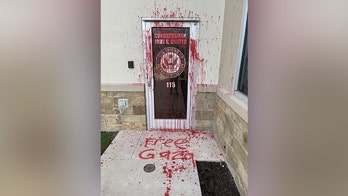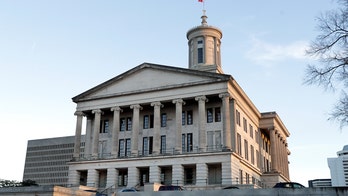The senior adviser to a pro-Newt Gingrich super PAC is defending the release of a 28-minute film on Mitt Romney's leadership at private equity firm Bain Capital even though the content has been discredited by fact-checkers and Gingrich has asked for inaccuracies to be corrected.
"We stand by the film," Rick Tyler, senior adviser to Winning Our Future, said of the release titled "King of Bain: When Mitt Romney Came to Town."
Tyler, who claims no animosity toward the free market system but called Romney a "vulture capitalist," said capitalism is one thing, looting companies is another.
Romney "is trying to claim he's a high flying eagle in the business world creating jobs when in fact, you know, Bain, 30 percent of their companies went out of business," Tyler told "Fox News Sunday." "And, in business, you know, there's winners and losers. But with Bain, sometimes you win and sometimes you win. ...
"Vultures, by the way, are good," Tyler added.
Chris Chocola, president and CEO of Club for Growth, a group that advocates limited government and free market enterprise, said the film distorts information that is taken out of context and uses it to draw conclusions that "free market capitalism is nothing more than a bunch of looting rich guys. They get rich at the expense of others."
Chocola, who appeared with Tyler via satellite, said not only is it an inaccurate depiction of private equity firms, but it distorts the benefits of the system.
"The problem is that Rick and Winning Our Future, his super PAC, are presenting the same vision of free market capitalism that people like Michael Moore and President Obama offer," Chocola said.
"The reality is that free market capitalism has done more for the soul of the human race than any other system. And it's created the highest standard of living and that's the message that every candidate, presidential candidate in the Republican side should be giving," he added.
While Romney has had to back off claims that he created 100,000 jobs while heading up Bain -- examples he used to reach that tally included hiring at mega companies like Domino's and Staples after Bain sold off its stake -- several fact-checkers have taken issue with several aspects of the film.
The Washington Post, for instance, reported that the timeline of events regarding the washing machine manufacturer UniMac is inaccurate. In the film, Romney is accused of shuttering the business after gutting the workforce and lowering the quality of the product, and walking off with a handsome profit.
But UniMac was sold by Bain in 2004, years after Romney left the company. On top of that, its new owners, a Canadian pension fund, shut down the Florida plant in 2005, but the manufacturer is still operating in Wisconsin today.
In addition, Tom and Tracy Jones, a couple interviewed in the film who used to work at UniMac, said they got a 30 percent raise while Romney's company owned the plant.
Tyler, who offered to release the entire transcript of the Joneses' interview, said the duo did accuse Bain of "cheapening the quality" of the product and reducing the workforce.
"What they said was I wish that Bain have left us alone back in the early '90s, when they were running as UniMac, because they were running as a fine company until (then)," Tyler said. "What Romney and Bain did typically was go in, load companies with debt, take exorbitant management fees so they couldn't survive in the long term."
In another assertion questioned by The Associated Press, the film says "nearly every U.S. state experienced job loss from the actions of Bain Capital under Mitt Romney." The AP points out that it may be factual if the closure of national toy retailer KB Toys counts, but Romney left Bain's management before it purchased or dismantled the toy company, which blames its ultimate failure on fierce competition from superstore chains.
As for DDi Corp, a tech manufacturing and engineering company, events again came after Romney left Bain, even though he did take a profit from DDi's stock sales after his departure. The Anaheim company never blamed Bain for its fall, but rather the bursting of the dotcom bubble. DDi has emerged from bankruptcy and is in business today.
In terms of American Pad and Paper, another case study in the film, Bain did acquire the company in 1992, then cut 385 jobs and closed two U.S. plants. The story was used to help defeat Romney in his senatorial bid against Ted Kennedy.
Tyler said part of his problem with Romney is that he is using his business record to run as a job creator in his bid for the presidency, but "he's no job creator."
"He was the guy who's going in and dismantling companies and destroying jobs. But that's part of the capitalist system. I don't have beef with that," he said, adding that Romney's name is listed as CEO and president of Bain on Securities and Exchange Commission filings as late as May 10, 2001.
"People ought to know that (Romney) is not a job creator," Tyler said. "If Newt said, I helped create 11 million jobs, I can back that up, because while he was speaker they did create 11 million new jobs. They paid off $400 billion worth of debt, they balanced the budget in four years, and they reformed welfare. That's a record to run on."
But Chocola, a former member of Congress, said Tyler's claims is "part of the fallacy of the argument."
"The government doesn't create jobs. The private sector does. I don't know how many jobs Bain created, but if they created one job, they created more sustainable jobs that grow the economy than the government does. ...
"There are actually many things that conservatives should be concerned about Mitt Romney's record. ... But his experience at Bain isn't one of those concerns," Chocola said.





